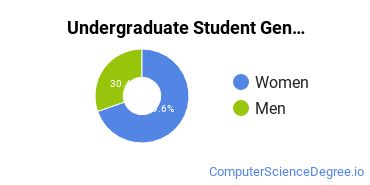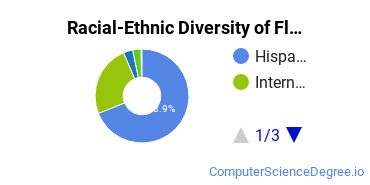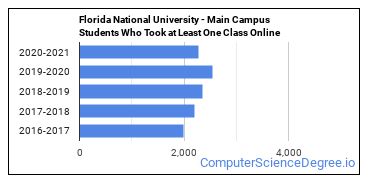Florida National University - Main Campus Computer Science Programs
Located in Hialeah, Florida, Florida National University - Main Campus is a private for-profit institution. The suburban atmosphere of Hialeah makes it a great place for students who want the amenities of city life without actually living in the middle of a constant hustle and bustle.
Featured schools near , edit
Where Is Florida National University - Main Campus?

Contact details for Florida National University - Main Campus are given below.
| Contact Details | |
|---|---|
| Address: | 4425 West. Jose Regueiro (20Th) Avenue, Hialeah, FL 33012 |
| Phone: | 305-821-3333 |
| Website: | www.fnu.edu |
How Do I Get Into Florida National University - Main Campus?
You can apply to Florida National University - Main Campus online at: www.fnu.edu/#homeForm
Can I Afford Florida National University - Main Campus?
Student Loan Debt
Almost 66% of college students who graduated with the class of 2018 took out student loans, but that percentage varies from school to school. At Florida National University - Main Campus, approximately 72% of students took out student loans averaging $12,914 a year. That adds up to $51,656 over four years for those students.
Florida National University - Main Campus Undergraduate Student Diversity

There are also 290 graduate students at the school.
Gender Diversity
Of the 2,238 full-time undergraduates at Florida National University - Main Campus, 30% are male and 70% are female.

Racial-Ethnic Diversity
The racial-ethnic breakdown of Florida National University - Main Campus students is as follows.

| Race/Ethnicity | Number of Grads |
|---|---|
| Asian | 3 |
| Black or African American | 72 |
| Hispanic or Latino | 1,542 |
| White | 64 |
| International Students | 552 |
| Other Races/Ethnicities | 5 |
Geographic Diversity
Florida students aren't the only ones who study at Florida National University - Main Campus. At this time, 6 states are represented by the student population at the school.
Over 50 countries are represented at Florida National University - Main Campus. The most popular countries sending students to the school are Venezuela, Brazil, and Vietnam.
Online Learning at Florida National University - Main Campus
The following chart shows how the online learning population at Florida National University - Main Campus has changed over the last few years.

This school is the 18th most popular in Florida for online learning according to the online graduations recorded by the Department of Education for the academic year 2022-2023.
The following table shows the 1-year growth rate of Florida National University - Main Campus majors that offer at least one online course. This table only includes majors with positive growth.
| Major | 1-Year Growth Rate |
|---|---|
| Information Technology | 73% |
Florida National University - Main Campus Computer Science Concentrations
The table below shows the number of awards for each concentration.
| Major | Associate’s | Bachelor’s | TOTAL |
|---|---|---|---|
| Information Technology | 6 | 9 | 15 |
| Network & System Administration/Administrator | 3 | 0 | 3 |
| Web & Multimedia Design | 0 | 0 | 0 |
| Computer Support Specialist | 0 | 0 | 0 |
| TOTAL | 9 | 9 | 18 |
References
*The racial-ethnic minorities count is calculated by taking the total number of students and subtracting white students, international students, and students whose race/ethnicity was unknown. This number is then divided by the total number of students at the school to obtain the racial-ethnic minorities percentage.
More about our data sources and methodologies.
Featured Schools
 Request Info
Request Info
|
Southern New Hampshire University You have goals. Southern New Hampshire University can help you get there. Whether you need a bachelor's degree to get into a career or want a master's degree to move up in your current career, SNHU has an online program for you. Find your degree from over 200 online programs. Learn More > |
